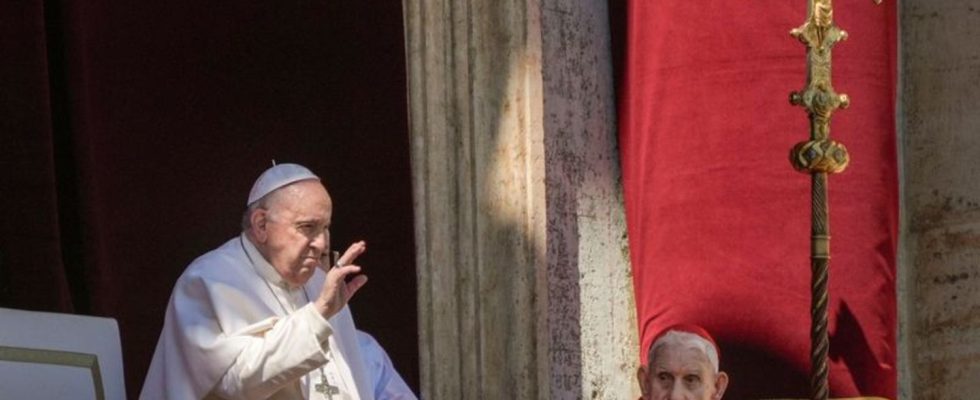Good Friday and Easter on TV
There used to be more Hallelujah – the noticeable TV secularization
Pope Francis (l) appears at the end of Easter mass in the main box of St. Peter’s Basilica in the Vatican. photo
© Gregorio Borgia/AP/dpa
Today it seems a pious wish that television would show religious films on Christianity’s highest festival. How Germany’s TV has become more un-Christian at Easter.
Germany is becoming less and less ecclesiastical. What science calls secularization is advancing. And German television also appears less and less Christian. That can be done Easter, the most important festival for Christians, even if RTL once again included its show event “The Passion” in the program during Holy Week – with celebrities singing the story of Jesus’ suffering.
It used to be common for the major television stations to broadcast Bible films or monumental hams with Christian-religious references throughout the Easter holidays. Germany’s leading TV stations have quite unanimously stopped doing this. There are still theological and religious programs, of course also TV church services.
Television program planners serve a market – and it has changed enormously in the past few decades. According to the Weltanschauung research group, around 70 percent of the population in Germany was a member of one of the large churches 30 years ago, around 63 percent 20 years ago and around 57 percent ten years ago.
By 2024, only around 45 percent of the population in this country will be Protestant or Roman Catholic. Churches are losing members. The Christian faith plays less and less of a role in public life in Germany. This is then also reflected in the media – for example on television at Easter.
Monumental films? None!
In the past, Easter traditionally focused on uplifting epics with references to the Bible, for example “Jesus of Nazareth”, “The Robe”, “Barabbas”, “Ben Hur” or “The Greatest Story of All Time”, but today such films are played at the most important festival Christianity no longer plays a central role in linear TV. If you’re looking for something like that, you have to turn on Bible TV or use streaming services.
The Italian sandal film “Barabbas” from 1961 about the murderer who is pardoned and Jesus is crucified in his place, was shown on Good Friday in 2022 and 2019 on BR television (i.e. the third broadcaster from Bavarian Radio). In 2024, the film starring Anthony Quinn will not be available on linear TV at Easter.
The Cinemascope epic “The Robe” from 1953 will also not be on the television program for the 2024 festival. In 2023 it was broadcast on Good Friday at noon on ZDF, and in 2020 on 3sat even in prime time. In 2018 and 2017, the film was shown on BR television’s late-night program on Good Friday.
The American feature film, which Arte also showed at Easter, is about a Roman tribune who wins Jesus’ robe while playing dice during the crucifixion of Christ and is then plagued with a guilty conscience.
In earlier years – in the 1990s and also in the noughties – this monumental film with Richard Burton in the lead role was, so to speak, part of the standard program for the Easter holidays, sometimes on ZDF, sometimes on Sat.1, sometimes on 3sat.
However, a complete downfall of the Christian West cannot be complained about on German television. The Easter television program on ARD and ZDF, for example, still includes a whole range of religious programs and TV church services.
The Pope, for example, can be seen on Good Friday praying for the Stations of the Cross in the Colosseum in Rome (9:10 p.m., BR television) and on Easter Sunday with his service and the blessing “Urbi et Orbi” at St. Peter’s Basilica (10:00 a.m. on ARD and BR television). ).
On Good Friday (10:20 p.m.) ZDF shows the scenic documentary “INRI – Why did Jesus have to die?”. The last days before the crucifixion are reconstructed. “What are historical facts and what are statements of faith?”

